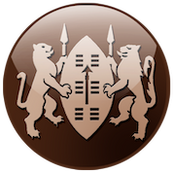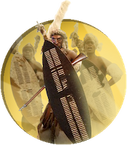The Zulu led by Cetshwayo is a custom civilization by TopHatPaladin, with contributions from Sukritact. It was released as part of the Civ V 10th Anniversary event. It also changes the capital of Shaka's Zulu to Kwa-Bulawayo.
This mod requires Brave New World.
Overview[]
Zulu Kingdom[]
After the increasing brutality of Shaka in his later life, he was assassinated by his half-brother Dingane in 1828. Dingane also went on a purge of the sons of Senzangakhona, leaving alive only Mpande, who was assumed to be a non-threat due to his relative disinterest in ruling. However, Dingane's aggression against the Boers led a Boer force to back Mpande in rebelling against Dingane, and so in 1840 Dingane was overthrown and killed. Mpande thus became king himself, although he continued to have limited interest in kingship, leading other key figures from the Zulu Kingdom to assume much of the power. In particular, Mpande's eldest son Cetshwayo fought off his various rivals to become the de facto ruler as early as 1856.
Despite Cetshwayo's efforts to maintain good relations with both the Boers and British in the region, his unwillingness to bend to British demands eventually led to the Anglo-Zulu War in 1879. This war, despite early Zulu successes, ended up as a British victory that caused Cetshwayo's ouster. Cetshwayo's successor, Dinuzulu, sought to preserve peace by making significantly more land concessions than his predecessors had. Zulu factions had broken into civil war in the first years of Dinuzulu's reign, and so he called upon the Boers for help; in return for their aid, Dinuzulu gave the Boers about half of Zululand's territory in 1884, including much of its coast. The British subsequently annexed the rest of Zululand in 1887.
Cetshwayo[]
Cetshwayo kaMpande was the last independent king of the Zulu Kingdom. He was born in approximately 1826 to Mpande, who at the time was a relatively minor half-brother of Shaka Zulu; however, Mpande eventually rose to the kingship in 1840. In the early 1850s, Cetshwayo then rose to prominence himself as one of Mpande's most important administrators. Cetshwayo's ascendancy led him into conflict with his younger brother, Mbuyazi, who was Mpande's favorite son; tensions mounted between the two and eventually boiled over into outright warfare. Cetshwayo crushed Mbuyazi's followers, and slew Mbuyazi himself, in the 1856 Battle of Ndondakusuka. After this victory, Cetshwayo's power only increased, and he became the de facto ruler of the Zulu under his father's auspices.
Once he had power, Cetshwayo used harsh methods to prevent rivals from emerging; in one incident in 1861, he ordered the killing Mpande's wife Nomantshali and her children. These efforts proved successful, and so Cetshwayo ultimately rose to the royal title in 1873. As king, Cetshwayo maintained an adept foreign policy, negotiating with the British and Boers to preserve Zulu sovereignty over as much land as possible. He also sought to introduce muskets to the impi regiments, but firearms were never popular among the actual soldiers.
Cetshwayo's continuing protection of the Zulu borders increasingly frustrated the British. The High Commissioner for Southern Africa, Henry Bartle Frere, ultimately took matters into his own hands by fabricating a pretext for war: after some minor diplomatic incidents in 1878, Frere sent a deliberately unacceptable ultimatum to Cetshwayo, demanding the disbandment of the Zulu army and the installation of a British agent in Zululand. Cetshwayo's refusal to comply with these terms led to the outbreak of the Anglo-Zulu War. This war was initially a success for the Zulu, especially after the successful Battle of Isandlwana; however, after the British retreated to Natal, Cetshwayo opted not to counterattack, out of a desire to avoid provoking further conflict. The British would not be deterred, though, and reinvaded Zululand with a much larger force; this time, they were able to rush Zululand and capture the Zulu capital of Ulundi.
After the fall of Ulundi in 1879, Cetshwayo was deposed and exiled. He lived in Cape Town and London for a few years, but in 1883, the British returned Cetshwayo to Zululand in the hopes that he could resolve a civil war taking place in the region. However, Cetshwayo died not long afterward, in February 1884. Theories differ as to whether he was poisoned or simply had a heart attack.
Dawn of Man[]

Art by TopHatPaladin
"Salutations, Cetshwayo kaMpande, the final king of an independent Zululand! In the cutthroat world of Zulu politics, you were one of its most adept players, besting Mbuyazi to become the de facto king during your father's later life. It was during this period that you developed your diplomatic skills, negotiating adeptly with British and Boers alike to ensure peace and minimize land concessions. You also sought to modernize the Zulu army by introducing muskets to the regiments, helping to iterate upon your uncle Shaka's achievements. The British ultimately fabricated a cause for war against you, but the first victory was yours, in the Battle of Isandlwana. While this war would end in your overthrow, you were still recognized for your many achievements, and people even in Britain would come to support your cause.
Cetshwayo, it is time for the Zulu to reassert their sovereignty against all those who would seek to encroach upon it. Can you repel all threats to your kingdom and establish an impenetrable realm? Can you build a civilization that will stand the test of time?"
Introduction: "I am Cetshwayo kaMpande, king of the Zulu. I believe we can forge a powerful alliance, as long as you give us the respect we deserve."
Defeat: "I will be gracious in my defeat. Perhaps now there may be rest."
Unique Attributes[]
Zulu (Cetshwayo)
|
|---|
|
Art by TopHatPaladin When the destination city of a |
Art by TopHatPaladin |
Art by TopHatPaladin
|
City List
|
Spy List
|

Music[]
| Peace Theme | War Theme |
|---|---|
| Link | Link |
| First Sight of Kwa-Bulawayo by Dave Pollecutt | Isandhlwana (Part 2) by Elmer Bernstein |
Mod Support[]
Additional Achievements[]
|
It's Over, I Have The High Place |
|
|
Who Needs The Maxim Gun? |
|
Unique Cultural Influence[]
"Our people are now practicing your stick-fighting and attending your calabash festivals. I worry that the rest of the world will also succumb to the influence of your culture."
Full Credits List[]
| Steam Workshop | |
| Latest Version: | v 1 |
| Last Updated: | 25 September 2020 |
- TopHatPaladin: Design, Code, Art, Text
- Sukritact: Map
- Dave Pollecutt: Peace Theme
- Elmer Bernstein: War Theme
| TopHatPaladin's Civilizations [edit] | |
|---|---|
Asia
|
Ayutthaya • Ghaznavid Empire • Golden Horde • Guge • Kakatiya • Ket • Northern Yuan • Pala Empire • Rashtrakuta • Sassanids • Sogdiana • Tang |
Africa
|
Egypt (Senusret III) • Fatimid Caliphate (al-Mahdi Billah) • Fatimid Caliphate (al-Mu'izz) • Ghana • Luba • Namibia • Sokoto • Somalia • Zulu (Cetshwayo) |
Europe
|
France (Louis XI) • Franks (Clovis) • Gaels • Holy Roman Empire (Frederick II) • Holy Roman Empire (Otto I) • Latvia • Rome (Romulus) |
Americas
|
Aleut • Aztec (Tlacaelel) • Bolivia • Cheyenne • Colonial Brazil • Guaycuru • Hohokam • Omagua • Tarascan State • Wampanoag • Yellowknives |
Oceania
|
Anangu • Chamorro • Ngarrindjeri • Noongar • Yali |
Collaborations
|
Hallownest • Oeselians • Tuva |



